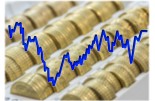AXA IM: Will the ECB take a dovish turn after September?

While there is little suspense on cutting by 25 bps this Thursday, the market will focus on any hints of “forward guidance” on the next steps from Christine Lagarde, writes Gilles Moëc, Chief Economist and Head of Research at AXA IM Group.
'We explored last week how the hawks are maintaining a very prudent view of the macroeconomic developments in the Euro area, which would make it difficult for Christine Lagarde to be straightforward on the trajectory. However, we think the very recent European dataflow has added more evidence that the ECB should sketch out a “decisive easing” trajectory', Moëc emphasizes.
Moëc points out that recent economic data, including the latest Q2 GDP estimates, suggest the Euro area is still struggling with "economic mediocrity." More critically, "actual wages per head decelerated" more than expected. Moëc writes: 'While unit labour costs have only started to slow down – and remain at a high pace – unit profits are now starting to contract. Businesses are now doing the opposite of the “greedflation” of 2022 and they are offsetting the labour cost push by lowering their margins. Incidentally, beyond the favourable impact this is having on inflation, the contraction in profits helps explain the deterioration in corporate investment which was confirmed in the new GDP estimate for Q2 – another reason for the ECB, in our view, to embark on a clear easing process.'
Even if Lagarde refrains from providing explicit guidance, Moëc suggests that the ECB’s new forecasts could signal a shift towards a more dovish stance. Another key input obviously will be the ECB’s new forecast batch. "The ECB is likely to forecast marginally lower headline inflation in 2024's annual forecast to 2.4% (-0.1pt), but we see risks of an 0.1 percentage point upside revision to 2.8% for 2024 core inflation forecast. For 2025 and 2026, the ECB should account for lower momentum in oil prices (-6% in average), and stronger euro (+2%). This should result in important revision for headline inflation to 1.9% in 2025 (-0.3pp) and 1.7-1.8% (from 1.9%) in 2026, while core inflation revisions should be much more limited - expected at 2.1% (-0.1ppt) in 2025 and unchanged at 2% in 2026" writes Moëc.









